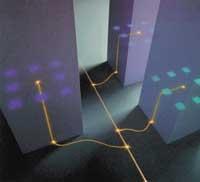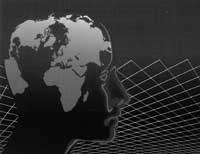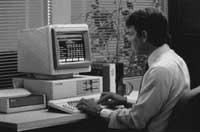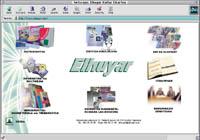Looking to the future
1997/05/01 Sarriegi Dominguez, Jose Mari Iturria: Elhuyar aldizkaria
Yesterday
When, in the 1960s, researchers working in the Defense of the United States saw the need for a computer network, they could not imagine the usefulness of their invention. As has happened with other things that have been invented for war, the communications network created by these pioneers has been evolving and spreading throughout the world. When we talk about communications network, of course, we take into account physical accessories, protocols, satellites, etc.
Once the physical bases of the network were established, the communication protocols were developed. Because they were necessary for the control of the robots that were created for the industry, in the 70's there was a great development in this field and later, taking advantage of this experience, Internet acquired and remodelled them.

The last step is the development and dissemination of PCs to date. From generation to generation, these computers are becoming cheaper, they are adapted to almost all needs and, without a doubt, is the most useful means of among the tools available. The advance in this field has been so important that computer illiteracy is an increasingly heard concept.
Today, today, today, Cuba
As is known, the pelagic nets are huge nets used for fishing in some places, which can reach ten kilometers. The intention of users of these networks is to capture large amounts of specimens of a given species (hake, besugo...), but with them all types of fish are captured. It is evident that this art of fishing has great benefits, but it provokes a massacre. It can be said that the Internet has a lot to do with pelagic networks. In the global network are trapped users, developers, traders, scientists, etc. Under the command of no one.
The initial idea of the Internet was to create a communications network for high-level researchers, but with the passage of time all have perceived the advantages, desire and need to be on the network. Once inside, it is impossible to escape from it because it becomes the main source of information necessary for our life. Until now we got in touch through the letters, but once we started to use the email, the initial communication is interrupted and from there we need a computer. However, before bowing deeply to this means of communication, one should ask whether the simplest binary language is sufficient (and adequate) to fully explain or transport the content and wisdom of the human mind.
The answer seems to be affirmative. The computer has been able to reproduce all the types of art that man has invented so far (except fishing) or at least the most important. It is already possible to create and receive literature, drawing, music, cinema, etc. through computers. The first steps in architecture and three-dimensional spaces have also been taken, and in view of the above, it can be assumed that the advances will arrive constantly. To carry it out, the problems that were being explained have been overcome, for example, the CD-ROM has allowed to transport easily a large memory capacity; the problem of the capacity at one time was solved by magneto-optical discs and a long etcetera. It seems that the human being has managed to bring together each and every expression in a unique and universal support, the simplest, in addition, in binary language.
Internet: an imaginary city

Telepolis (tori!) what netizens do (tori and tori!) As they say, the Internet network is the main street of a real city, where television and phones are the smallest streets. In this extensive and extensive street, as in all the main streets of the cities, you can find everything: ruthless vendors, thieves, sex professionals, altruistic teachers of good heart, etc. Everything points out that only the mayor, or alGates, who knows, is missing to be a real city. However, this new city has a problem that can never overcome: virtuality or virtuality, that is, it does not exist. Like the knight of Italo Calvino, the ability to exist lies in his pure will.
Problems with problems Problems
The Internet, however, resembles real cities. As in large cities, the most serious problems on the Internet are security, traffic and the distribution of controls. Currently, a lot of work is being done in the field of security, which is the main responsibility of companies that are looking at the Internet. However, as in the real world, the advances made to ensure security are accompanied at all times by advances in the other direction. Every day news about the achievements of hackers is published.
In many cities the number of vehicles is unsustainable. The same happens on the Internet: it can no longer carry a lot of information at the right speed. This information, in addition, is increasingly complex and the network was not created for this type of “vehicles”. If the High Speed Train entered the road that goes up to Igeldo, of course, it would not be a high-speed train. There are many obstacles to improving the physical bases of the network: economic problems, monopolies in some territories, continuous transformations, etc. It is evident, therefore, that the train itself has been built before the railroad.
In many cities, on the other hand, a serious obstacle to development is the need to reach a multilateral agreement. Also in the network is one of the key points that will have to be resolved in the short term. Previously you will have to decide who should make the decisions and that will be more difficult. Do not forget that the economic and political interests surrounding the Internet are and continue to grow.
Hypertext: path that leads to the mixture

A few hours are enough to learn the HTML language (Hyper Text Markup Language) needed to put documents into this network. With the help of any editor, the one who works in this work becomes immediately expert. These week-long experts say aloud that no one has the opinions based exclusively on their criteria, and that, like those repeated by someone who knows little, they are indisputable. This phenomenon can be called “the problem of the improvised expert”.
Anyone can, therefore, develop documents on the Internet and that generates problems. These documents usually contain links and, if not properly organized, can mislead users, taking them from one place to another without meaning. Therefore, working many times within the Internet becomes a labyrinth.
Tomorrow morning
Internet: Internet: An insuperable virtual wall?
If analysed only from the surface, it seems that the Internet has united dispersed peoples around the world, creating or facilitating relationships between them. The Network, therefore, could be a tool for the creation and dissemination of global culture from this perspective. However, it is also undeniable that the border between those who have and do not have the Internet can be insurmountable. Although most of the advances related to communication (television, telephone, other streets of the city, do not forget) were born to strengthen ties, for those who do not manage to have them, they can provoke a great exclusion.
The hierarchy that hides the fact that the Internet classifies some computers as servers or servers and others as clients or recipients is also very significant, since in this way a few can control the information we all receive.
Who should work and how?
We are all able to be recipients of the Internet, but who has to work to make something reasonable in it? We can give three possible answers: scientists, development engineers and artists.
Scientists research in leading fields, create new technologies and techniques that make it easier for others to be able to develop anything. Therefore, the work of scientists is not to elaborate documents, pages or works for the Internet, but to facilitate their easy, quick and better realization. Scientists will always work towards the future, because it is still a very broad field. However, in some cases it would be convenient to carry out consultations.
The engineering's own field of work is the one that runs from the creation of work models to the demonstration of the work done; starting from the conditions and conditions given above, they follow the path towards the best response. The work they do is systematic. That has, of course, its good and bad side; that work is usually fast and adjusted to needs, but it also has its negative side, since most of the jobs are very similar. In the working tools a standardization process is necessary, but in the final product, the product that wants to be the exponent of the company itself, is essential a differentiating tone, a particular trait that indicates the nature of this company.

The artists are specialists in labor to give this particular feature. Artists usually take a long time to finish their work and, of course, with the current lifestyle this has become a problem. That is why the question you have to hear most is: “Is it already done?”
As you can see, to work on the Internet, it is essential to work as a team that is often mentioned today, that is, to take the best differences of each type of staff and to strengthen the group by abandoning the bad ones.
After analyzing who has to, let's know how to do it. This, do not believe, looks clearer. The current cost of testing on computers is relatively low, so the basic working technique must be iterative. Knowing the solution or approximation of the solution to which iteration is intended, it is the solution given in that direction. Its main characteristic is that the result obtained in each period is more accurate than the following, that is, that the value you want to achieve is closer than the previous one.
Thus, the first step of iteration is to propose a solution. Subsequently, the differences with the real solution of the proposal are analyzed and a new solution is proposed that reduces these differences. The results obtained step by step, therefore, are improving and when this result is considered sufficient, iteration is interrupted. Of course, the criteria for deciding this moment must be determined previously.
As previously mentioned, iteration is the most used working method, but it also has problems when, in addition to the proposed solution, the proposed solution is variable. The objective of the project is decided in the analysis phase, so often this phase is the most critical moment of the project. The analysis requires two components: static and dynamic analysis.
The static analysis will propose the most appropriate response to the problem that has been raised today, while the dynamic will analyze where this solution should go until the completion of the project. It is very important to make an adequate prior measurement of this solution change, since in the worst case the project can be in a state of divergence. This state of divergence usually occurs when the proposed solution initially advances less than the target solution. It is evident, therefore, that we should not forget the dynamic analysis in such a changing environment.
Commercial struggle
The destiny of the Internet will be determined by the current commercial struggle in the world. Microsoft, Netscape, Sun, Oracle, IBM and their colleagues don't know where to make money. When you clarify this, the future of the network will be much clearer. However, it seems inevitable to be linked to entertainment, the most profitable business of this end of the century.
However, one of the main tasks of the Internet would be regrettable that, after so many conversations, football matches could be seen.

Gai honi buruzko eduki gehiago
Elhuyarrek garatutako teknologia





